
MLS Betting Guide
Early Days
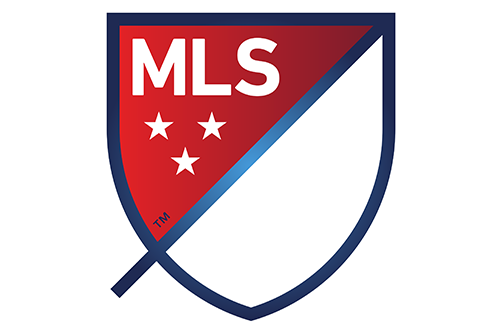 With just ten teams playing in its inaugural 1996 season, Major League Soccer (MLS) was millions of dollars in debt and struggling to attract fans.
With just ten teams playing in its inaugural 1996 season, Major League Soccer (MLS) was millions of dollars in debt and struggling to attract fans.
The new league averaged over 17,000 fans in their first year, but the novelty of a new form of entertainment soon wore off, and the crowds thinned. By 2000, MLS average attendance was down to 13,756 per game, an all-time low.
The MLS had expanded to twelve teams by this point but was soon back to the original number of ten in 2002 due to a lack of fan support. During this season, they played their fewest number of games ever and experienced their lowest total attendance in league history. Struggling to gain popularity, something needed to be done.
The “David Beckham” rule of 2007 saved Major League Soccer. Formally named the Designated Player rule, this clause allowed teams to roster international star players that were normally out of their budgets. The Premier League and La Liga standout David Beckham was the first player signed under this rule, going to the LA Galaxy.
Nearly every team followed suit and went after international stars. Today, this exception accounts for the league’s rising popularity and its high concentration of European talent.
What Are They Playing For?
What exactly is at stake for the MLS teams each year? The team with the best regular-season record earns the Supporters’ Shield, while the winner of the postseason tournament wins the MLS Cup. Unlike most foreign leagues, there is no promotion/relegation system in MLS soccer.
Each season, American soccer teams compete in the domestic Lamar Hunt US Open Cup. This contest has been ongoing since 1914 and is the oldest national soccer tournament in the US. The winner receives one of America’s four berths to the CONCACAF Champions League.
The CONCACAF Champions League plays each year to determine the best club in North and Central America and the Caribbean. The United States’ other three berths are given to the MLS Cup winner, the Supporters’ Shield winner, and the other conference winner. If a team wins more than one of these, the remaining berths fall to the teams with the best regular-season records.
The MLS clubs cannot seem to match the firepower of those of the Mexican Soccer League, whose teams have won well over half of the championships since the tournament was established in 1962. American clubs have won this tournament twice in history, with their last title in 2000.
Best Sites for MLS Betting
American bettors have two options. You may head to a land-based sportsbook, or you can place bets with an online, offshore book. MLS bettors will definitely want to choose the offshore books, as they often focus their attention on popular European soccer leagues, leaving more beatable lines for lesser leagues like the MLS.
A general rule of thumb in sports betting is that less popular leagues are more easily beaten. This is because sportsbooks will study harder and devote more time to posting accurate lines for games they know will receive plenty of action. A second-tier league like the MLS does not receive a high volume of bets and thus is not prioritized by books. As a sports bettor, this is exactly what you want to see.
When choosing a sportsbook, it is important to consider four main factors: reliability, customer service, options, and bonuses.
A good book pays out quickly every time, and they resolve any complaints you have in a timely manner. Good books have a plethora of betting options and large free play and deposit bonuses with reasonable rollover requirements.
Because there are so many sportsbooks out there for you to choose, you have no excuse to be playing at a book that does not excel in each of these four areas. To save you time, we have compiled a list of some of our favorite sportsbooks, based on these factors. These books are all highly recommended.
| RANK | BETTING SITE | SIGN UP BONUS | GET STARTED |
|---|---|---|---|
 Betway Betway |
up to €30 Free Bet | VISIT SITE | |
 Spin Sports Spin Sports |
100% up to €200 | VISIT SITE | |
 888sport 888sport |
100% up to €200 | VISIT SITE |
Types of Bets Available
1×2 or Moneyline Bets
The most common bet placed on MLS matches is a “1×2” bet. With 1×2, you may either bet that the home team wins (1), the visiting team wins (2), or that the match ends in a draw (x). This is equivalent to a moneyline bet in a sport like baseball or basketball.
Below is an example of a 1×2 line for a match between LA and New York. If you need a refresher on odds, you can read some basics here.

Keep in mind for 1×2 betting that most books consider a bet finished after full-time. The results from extra time or penalties usually do not count. Check the rules for your book before you bet.
Spreads and Totals
Sportsbooks will also release goal spreads for MLS matches. These are especially useful for the matches projected to be lopsided. The better team may be given a -1.5 spread, for example, meaning they must win the match by at least two goals for you to win your bet. Anyone who bets basketball or NFL football should be very familiar with spread betting.
The spread is useful when you want to bet on a large favorite that you think will win handily. Rather than laying huge odds on the 1×2, you can bet the spread and get the standard -110 odds, a much better value. Searching around for the best value bets will do wonders toward maximizing your profits.
Like in other sports, you may also bet the over/under goal total in MLS soccer. This bet allows you to predict whether the total number of goals scored in the match will be greater or less than a preset number. This bet is useful for when you believe the match will be either very high- or low-scoring but cannot decide who will win.
Continuing the above example, say that you cannot decide who you think will win between the Galaxy and the Red Bulls, but you notice the total is set at three goals. If you believe that the teams will combine for more than three goals, you can bet the over and will not have to worry about who wins the match.
A little pro tip is that in many sports, the books lower their maximum allowed bets for totals. This indicates that they have a higher likelihood of losing these bets. Learn from this and know that totals provide excellent value and are more easily beaten than 1×2 or spread bets. There are some professional sports bettors who make their living purely on totals bets.
Props and Futures
There are also many prop bets available for the MLS. These include the first goal scorer, the time of the first goal, and the half-time score. Prop bets always provide an added element of fun and thrill to soccer betting.
Another pro tip is that Vegas prop bet odds are very valuable for players of fantasy sports. For example, if Vegas labels a certain striker as the most likely to score in a given match, he should be in your starting lineup.
For those blessed with patience, futures provide the greatest value of any bet offered by a sportsbook. Futures get their name because you are betting on things that will occur later in the season.
Common futures bets in the MLS include the winner of the Eastern and Western conferences, the winner of the Supporters’ Shield, and the winner of the MLS Cup. Because these are such long-term bets with so many variables, they are extremely difficult for Vegas to predict. You will find that large underdogs perform quite well in futures bets.
Best Players in MLS History
Landon Donovan
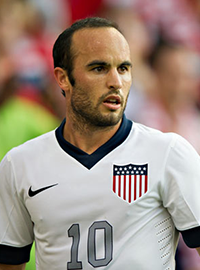 One of the few Americans to star in Major League Soccer, forward Landon Donovan played for the San Jose Earthquakes from 2001-2004 and the LA Galaxy from 2005-2014 and then again in the 2016 season. He left as one of the league’s all-time greats.
One of the few Americans to star in Major League Soccer, forward Landon Donovan played for the San Jose Earthquakes from 2001-2004 and the LA Galaxy from 2005-2014 and then again in the 2016 season. He left as one of the league’s all-time greats.
Donovan holds the record for most MLS goals with 145 and also most MLS assists with 136. His best season was 2009 in which he won the MLS MVP with a 15-goal season, leading his Galaxy to the Cup Finals. Though he fell short in ‘09, Donovan ended his career as a six-time MLS Cup champion. He was also a seven-time member of the League’s Best XI, which is similar to the NBA First Team award or the NFL’s All-Pro First Team.
The LA Galaxy has been the winningest team in Major League Soccer’s young history, and Donovan is largely to thank for that. He led the team to four of their five MLS Cups and two of their four Supporters’ Shields. Without his efforts, the landscape of the MLS would likely have developed very differently.
Donovan’s most prestigious honor is the fact that the MLS MVP award was renamed to the Landon Donovan MVP Award prior to the 2015 season. This measure ensures that his name and legacy will continue far into the future, as it should.
Jaime Moreno
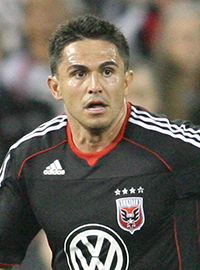 A star from the league’s birth, Jaime Moreno played two stints for DC United from 1996-2002 and then from 2004-2010. He played for the New York Red Bulls in 2003. The Bolivian forward netted 133 goals and 102 assists in his storied career.
A star from the league’s birth, Jaime Moreno played two stints for DC United from 1996-2002 and then from 2004-2010. He played for the New York Red Bulls in 2003. The Bolivian forward netted 133 goals and 102 assists in his storied career.
Like Donovan, Moreno also won four MLS Cups. Moreno would lead DC to four Supporters’ Shields, as well. In 1998, Moreno led DC United to a CONCACAF Champions League title, the first in American history. He was also named to five MLS Best XI teams, although he never captured that elusive MVP award.
It is safe to say that Moreno put DC United on his back. DC has not won another Cup or Shield since Moreno hung up his spikes. DC fans have Moreno to thank for helping them become the second-most winningest franchise in MLS history.
As one of the league’s original players, Moreno receives much praise and recognition for not bailing on the MLS when the league was scuffling through the late 1990s and early 2000s. Moreno was a big part of the reason the MLS was able to remain operational and draw fans through those tough early years.
Moreno even went on to manage DC United from 2011-2013, showing his extreme dedication and love for the league and the DC franchise.
Robbie Keane
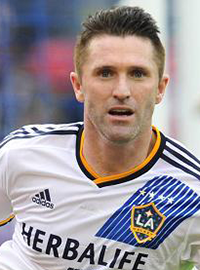 The first Beckham Rule transfer on our list, Robbie Keane fit the mold of a stereotypical Designated Player. The British forward starred in the Premier League before coming over to the States at the age of 31. Playing from 2011-2016, Keane spent his entire MLS career on the LA Galaxy.
The first Beckham Rule transfer on our list, Robbie Keane fit the mold of a stereotypical Designated Player. The British forward starred in the Premier League before coming over to the States at the age of 31. Playing from 2011-2016, Keane spent his entire MLS career on the LA Galaxy.
Keane scored 104 goals in his six-year career and was widely considered to be one of the league’s top players. His accolades include four MLS Cup titles, one Supporters’ Shield, one MLS MVP award, and four Best XI honors.
Keane played alongside Landon Donovan for several years, and the two comprised the greatest duo in the history of the league, winning three Cups and cementing the Galaxy as Major League Soccer’s premier franchise.
Jeff Agoos
 Another MLS original, the Swiss-born defender Jeff Agoos played in the MLS from its creation in 1996 until his retirement in 2005. He played for DC United, the San Jose Earthquakes, and the New York Red Bulls. After his playing days, he remained with the Red Bulls as their Sporting Director before becoming the league’s Vice President of Competition.
Another MLS original, the Swiss-born defender Jeff Agoos played in the MLS from its creation in 1996 until his retirement in 2005. He played for DC United, the San Jose Earthquakes, and the New York Red Bulls. After his playing days, he remained with the Red Bulls as their Sporting Director before becoming the league’s Vice President of Competition.
Agoos was renowned as one of the game’s best defenders. Alongside Jaime Moreno, Agoos won three MLS Cups and two Supporters’ Shields in the late 1990s. Agoos was the rock of DC’s stout defense that won them the CONCACAF title in 1998, America’s first title in that tournament’s history.
Agoos would then go on to win two more MLS Cups in the early 2000s with San Jose alongside Landon Donovan. Agoos’ five Cups are second all-time to Donovan’s six.
Much like Jaime Moreno, Agoos was an original player who stuck it out through the rough patches of Major League Soccer’s infancy. The league’s success can be attributed, in large part, to the efforts of Jeff Agoos.
David Beckham
 We cannot discuss the best MLS players without bringing up David Beckham. While he may not have had great MLS success like other players on this list, he was the first European star to come over in 2007, beginning a trend that would change the league forever.
We cannot discuss the best MLS players without bringing up David Beckham. While he may not have had great MLS success like other players on this list, he was the first European star to come over in 2007, beginning a trend that would change the league forever.
Playing for the LA Galaxy from 2007-2012, Beckham instantly became the league’s most popular and highest-paid figure. After his entrance into the league, the MLS-high average attendance increased each season until 2013.
Immediately after signing Beckham, the owners of the Galaxy, Anschutz Entertainment Group, received unprecedented boosts in sales and international recognition. The signing did wonders financially for both AEG and the Galaxy. This phenomenon led other MLS franchises to pursue aging European stars, a practice that is now commonplace throughout the league.
Although he scored just twenty goals for the Galaxy, Beckham won two MLS Cups, two Supporters’ Shields, and was named the ESPY’s Best MLS Player twice. He may not have always performed well on the pitch while in LA, but he was always the league’s most hyped player. No one has impacted the MLS quite like David Beckham.
Best Teams in MLS History
LA Galaxy
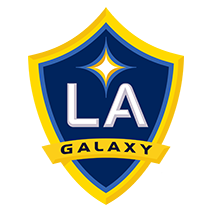 If you read through the best players section directly above, you likely noticed that many star players have donned the Galaxy jersey. It is no wonder that LA has been the league’s most successful team throughout its short history.
If you read through the best players section directly above, you likely noticed that many star players have donned the Galaxy jersey. It is no wonder that LA has been the league’s most successful team throughout its short history.
The Galaxy have won a record five MLS Cups while reaching a record nine title games. LA has also won four Supporters’ Shields, tied with DC United for the most of all time. In 2000, the Galaxy won the CONCACAF Champions League, becoming just the second American team take home the title.
The Galaxy have rostered many of the league’s most prominent players, and as a result, they hold the most lucrative media deal in the MLS. As explained earlier, their signing of David Beckham in 2007 changed the league forever. In 2011, the Galaxy had the best trio in MLS history – Beckham, Landon Donovan, and Robbie Keane – lead them to the MLS Cup victory.
The Galaxy have two main rivals: the San Jose Earthquakes and Los Angeles FC. Games against the Earthquakes are dubbed the “California Clasico,” while those against LAFC are humorously referred to as “El Trafico,” a play on Madrid and Barcelona’s “El Clasico.”
DC United
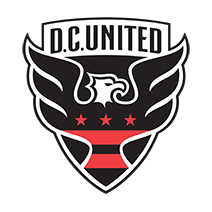 With four MLS Cup victories in five appearances, DC United is the second-most winningest franchise in MLS history. With great talent throughout the years such as Jaime Moreno, Jeff Agoos, Eddie Pope, and Marco Etcheverry, DC has become the team to beat on the east coast.
With four MLS Cup victories in five appearances, DC United is the second-most winningest franchise in MLS history. With great talent throughout the years such as Jaime Moreno, Jeff Agoos, Eddie Pope, and Marco Etcheverry, DC has become the team to beat on the east coast.
DC United has won four Supporters’ Shields, tied with the LA Galaxy for the most ever. In 1998, DC won the CONCACAF Champions League, becoming the first ever American team to pull off the feat.
Back in the 1990s, a rivalry was kindled between DC United and the LA Galaxy as they met in two MLS Cup finals. Currently, however, DC’s main rivals are the New York Red Bulls, the Philadelphia Union, and the Charleston Battery of the United Soccer Leagues.
Toronto FC
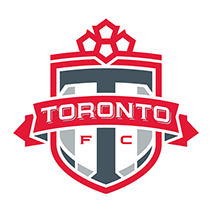 In recent years, Toronto has emerged as one of the league’s top teams. Losing in penalties in the 2016 Cup final, Toronto bounced back to capture the Cup in 2017. 2017 also marked the first time Toronto won the Supporters’ Shield. Their magical season nearly turned into a rare treble as Toronto once again lost on penalties to the Mexican club Guadalajara in the 2018 CONCACAF Champions League final.
In recent years, Toronto has emerged as one of the league’s top teams. Losing in penalties in the 2016 Cup final, Toronto bounced back to capture the Cup in 2017. 2017 also marked the first time Toronto won the Supporters’ Shield. Their magical season nearly turned into a rare treble as Toronto once again lost on penalties to the Mexican club Guadalajara in the 2018 CONCACAF Champions League final.
They have been tearing up the MLS, but Toronto has also enjoyed much success in their own domestic cup, the Canadian Championship, winning six titles. Toronto’s biggest rival is the fellow Canadian MLS club, the Montreal Impact. Their proximity and meetings in the Canadian Championship have caused this rivalry to become one of the biggest in North America. In fact, the MLS record for visiting crowd attendance was set by Toronto fans traveling to Montreal.
Betting Strategy for the MLS
Home-field advantage is huge in the MLS. This is definitely a league where the chalk is a safe bet at home. Also, big upsets are prone to occurring on the road. In the two-year stretch from 2016 to 2017, the top three teams in each conference combined for a 66.7% win rate at home while losing only 10.3% of their home matches.
For comparison, the top three MLB teams in each league over the 2016 and 2017 seasons won 63.2% of their home games, of course meaning that they lost 36.8%. Top MLS teams win home matches at a fairly comparable rate to other sports, but they rarely lose at home, especially to a bad team.
If you are betting MLS soccer, never forget how important and real the home-field advantage is. Our advice is to not blindly bet on home teams but to weigh home-field advantage heavily in your handicapping research.
Why Bet MLS Soccer?
Americans absolutely love the MLS, but it is seen by the world as a second-tier league. Vegas odds are not always razor-sharp for MLS matches because bookmakers do not receive tons of MLS bets. Oddsmakers spend the most time studying and analyzing their most popular bets, and the MLS has not achieved this level of international popularity.
Unlike the European leagues, the MLS is playing right in your backyard and is easy to keep up with. If you are looking to begin betting soccer, the MLS is the perfect league to get your feet wet. Familiarize yourself with the teams, players, and matchups to the point that you can discern good lines from bad ones as your sportsbook releases them.
This league is expanding rapidly. Now is the perfect time to jump in, put your knowledge to use, and profit from it.